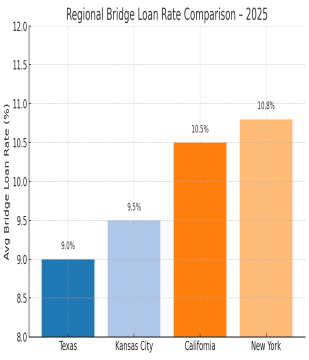Equity Financing In Commercial Real Estate

Terrydale Capital
Aug 21, 2023 16 Min read
Introduction:
In the world of commercial real estate, the pursuit of financing options to fund lucrative projects is a constant endeavor for developers and investors alike. One approach that has gained significant traction is equity financing. This blog post aims to shed light on the concept of equity financing, its relevance in commercial real estate, and the benefits it offers to investors seeking opportunities in this sector.
Understanding Equity Financing:
Equity financing refers to the process of raising capital by selling ownership stakes in a company or project. In commercial real estate, equity financing involves pooling funds from multiple investors who become equity partners in the venture. These investors provide capital in exchange for a share of ownership and potential profits generated by the property.
Equity Financing in Commercial Real Estate:
Commercial real estate projects often require substantial capital to acquire properties, develop projects, or renovate existing structures. Equity financing can be a crucial source of funds in these scenarios. Developers and property owners seek equity investors to contribute a portion of the required capital, reducing their personal financial burden and mitigating the risks associated with large-scale investments.
The equity financing structure typically takes the form of limited partnerships, joint ventures, or real estate investment trusts (REITs). These structures provide a legal framework for investors to participate in commercial real estate projects while having the potential to earn returns through rental income, property appreciation, or profit-sharing upon property sale.
Benefits of Equity Financing for Investors:
- Diversification and Access to High-Value Properties: Equity financing allows individual investors to gain exposure to high-value commercial properties that would otherwise be beyond their reach. By pooling resources with other investors, they can collectively invest in large-scale projects, diversifying their investment portfolios and benefiting from the potential appreciation and income generation of these properties.
- Professional Management and Expertise: Investors in equity-financed commercial real estate projects can rely on the expertise of experienced developers and property managers. These professionals possess in-depth knowledge of the industry, enabling them to identify lucrative investment opportunities, negotiate favorable terms, and manage the day-to-day operations of the properties. Such expertise reduces the burden on individual investors and enhances the likelihood of success.
- Passive Income and Portfolio Growth: Equity investors in commercial real estate projects can enjoy regular income in the form of rental payments. The revenue generated from leased properties is distributed among the investors based on their equity shares. This passive income stream can provide stability and consistent returns, making it an attractive option for investors seeking long-term wealth creation and portfolio growth.
- Potential for Capital Appreciation: One of the significant advantages of equity financing in commercial real estate is the potential for capital appreciation. As the property value increases over time, the investors' equity stakes also appreciate, enabling them to earn profits when the property is sold or refinanced. This potential for substantial returns adds a lucrative dimension to equity investing in commercial real estate.
- Mitigating Risk Through Shared Liability: When investing in commercial real estate through equity financing, the investors' personal liability is typically limited to their capital contribution. This shared liability structure reduces individual risk exposure, as investors are not solely responsible for potential losses or legal liabilities. The risk is distributed among all the equity partners, providing a sense of security to investors.
Drawbacks of Equity Financing:
- Loss of Full Control: One of the significant drawbacks of equity financing is the loss of complete control over the property or project. By bringing in equity partners, the original owner or developer must share decision-making authority and may need to seek consensus on important matters. This shared control can lead to potential conflicts, differences in opinions, and delays in decision-making processes, which could impact the overall efficiency and execution of the investment strategy.
- Dilution of Ownership and Profits: Equity financing involves selling a portion of the ownership stake to investors, which leads to dilution of ownership. As a result, the original owner or developer has to share the profits and potential appreciation of the property with the equity partners. The profit-sharing arrangement may reduce the individual return on investment compared to a scenario where the property is solely owned. Investors should carefully assess the expected returns and weigh them against the diluted ownership and profit-sharing implications.
- Complex Structure and Governance: Equity financing often involves complex legal and governance structures, such as limited partnerships or joint ventures, which require careful planning and documentation. Establishing these structures and ensuring compliance with regulatory requirements can be time-consuming and costly. Additionally, managing the ongoing governance and reporting obligations associated with equity financing can add administrative burdens for the property owner or developer.
- Higher Cost of Capital: While equity financing provides access to capital, it generally comes at a higher cost compared to debt financing options. Equity investors expect to earn a higher return on their investment to compensate for the increased risk they assume. This higher cost of capital can impact the overall profitability and viability of the project, as the returns generated by the property need to exceed the cost of equity to deliver satisfactory results.
- Limited Flexibility: Equity financing in commercial real estate often entails a longer investment horizon and reduced flexibility compared to other financing options. Investors typically commit their funds for the long term, and liquidity options may be limited. Exiting an equity-financed investment can be challenging, as it may require finding a buyer or refinancing the property. Investors should carefully consider their investment time frame and liquidity needs before engaging in equity financing.
- Market Volatility and Risk Exposure: Commercial real estate investments are subject to market volatility and various risks, including changes in economic conditions, interest rates, and local market dynamics. Equity investors bear a significant portion of these risks, as the value of the property and rental income can fluctuate over time. Economic downturns or unfavorable market conditions can impact the investment's performance and potentially lead to lower returns or even losses.
Equity Financing vs. Debt Financing
Equity Financing:
- Ownership Stake: In equity financing, investors contribute capital in exchange for ownership stakes or shares in the property or project. They become equity partners and have a claim on a portion of the property's future profits and potential appreciation. The property owner or developer relinquishes a percentage of ownership in exchange for the funds received.
- Profit Sharing: Equity investors participate in the property's profits through profit-sharing arrangements. Their returns are typically based on the performance of the property, including rental income and potential capital appreciation. The profit distribution is proportional to the equity partner's ownership percentage.
- Control and Decision-Making: Equity investors have a say in major decision-making processes related to the property or project. They may participate in discussions and have voting rights on matters such as property management, leasing agreements, and capital expenditures. The property owner or developer must consider the opinions and consensus of the equity partners.
- Risk and Liability: Equity investors assume a share of the risk associated with the property or project. Their liability is generally limited to the extent of their capital contribution. In case of property-related losses or legal liabilities, the investors' personal assets are typically protected beyond their capital investment.
Debt Financing:
- Borrowed Capital: In debt financing, the property owner or developer borrows funds from lenders or financial institutions. The borrowed amount must be repaid over a specified period, usually with interest. The property owner retains full ownership and control of the property throughout the repayment term.
- Fixed Repayment Schedule: Debt financing involves a fixed repayment schedule, outlining the amount of principal and interest to be repaid over time. Regular payments, often monthly or quarterly, are made to the lender until the debt is fully repaid. The repayment amounts and schedule are agreed upon at the outset of the loan.
- Interest Payments: Debt financing requires the payment of interest, which represents the cost of borrowing. The interest rate is determined by various factors, such as market conditions, creditworthiness, and the specific terms of the loan agreement. The interest payments are in addition to the principal amount and represent the lender's return on investment.
- Limited Control by Lenders: Lenders providing debt financing typically have limited control over the property or project. They are primarily concerned with the borrower's ability to repay the loan and may have certain rights, such as placing liens on the property as collateral. However, day-to-day management and decision-making authority remain with the property owner or developer.
- Lower Risk for Lenders: Debt financing poses less risk to lenders compared to equity financing. The lenders have a legal claim on the property as collateral and can enforce repayment through foreclosure or other legal remedies in the event of default. The property owner or developer has a legal obligation to repay the loan as agreed upon in the loan agreement.
Conclusion:
Equity financing has revolutionized the commercial real estate landscape, offering investors an avenue to participate in large-scale projects, diversify their portfolios, and generate income through rental payments and potential capital appreciation. By leveraging the expertise of industry professionals and sharing risk with other investors, equity financing presents a compelling opportunity to enter the commercial real estate market and reap the rewards of this dynamic industry. As with any investment, it is crucial for investors to conduct thorough due diligence and work with reputable partners to maximize the potential benefits and mitigate risks associated with equity financing in commercial real estate. If you’re seeking alternative financing methods, contact us at Terrydale Capital where our experienced team is at the ready for your investing success.
Partner With Terrydale Capital for Your Debt Financing Needs
When it comes to debt financing, understanding the right timing, process, and options is crucial. At Terrydale Capital, we provide a comprehensive range of commercial loan solutions tailored to meet your business's unique needs.

































































































































































































































































































































































